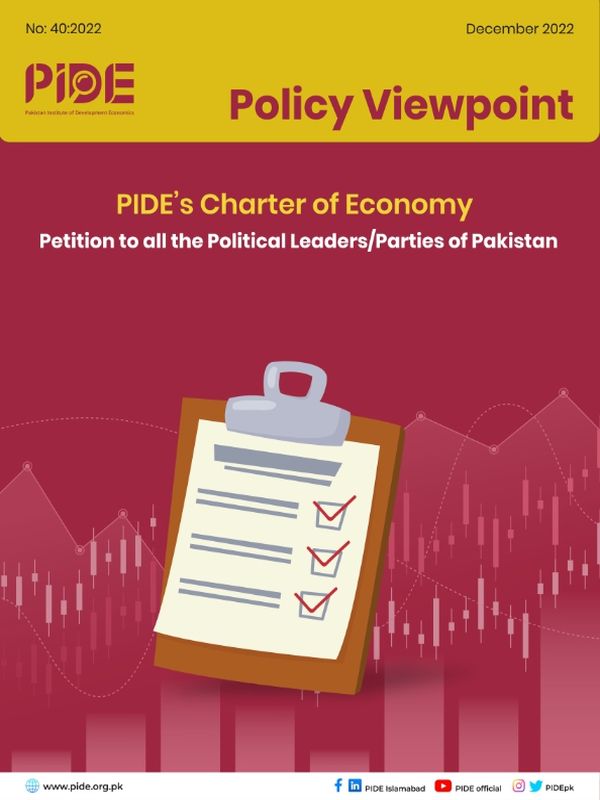
Pakistan Institute of Development Economics
- Home
Our Portals
MenuMenuMenuMenuMenuMenuMenu - ResearchMenuMenuMenuMenuMenuMenuMenu
- Discourse
- The PDR
- Our Researchers
- Academics
- Degree Verification
- Thesis Portal
- Our Portals
PIDE’s Charter of Economy: Petition to all the Political Leaders/Parties of Pakistan (PIDE Policy Viewpoint 40:2022)
Making the Case
Without any doubt, Pakistan is in on an economic tailspin, swiftly spiraling downwards. The country’s economic indicators over the last seventy-two years have fluctuated widely without a clear and sustainable growth trajectory. Despite experiencing extreme economic and political experimentation, the country has still been unable to break with the ramshackle of its unstable development enigma. The country needs an instant economic roadmap to escape the current chaos.
The issue is the politicisation of the economy and consequent bad governance. Politics and economics must be delinked if we are to take on the path of economic growth and development in the real sense of the word. Politics is messy everywhere, but in most countries, politics and economy are separated into mutually exclusive domains. Hence, a charter of the economy is the need of the time.
In this context, a political consensus in Pakistan is critical because implementing this charter in letter and spirit seems highly unlikely without a broad-based political consensus. Developing political consensus and implementing the agreed-upon framework in letter and spirit is inevitable for policy consistency and continuity for at least the next 15 years.
PIDE, thus, presents its “Charter of Economy” to serve as a live document and a blueprint for future policy frameworks for long-term economic growth and development.
Setting the Fundamentals Right
The problem at the core is that the state machinery is not fit for purpose, with each one encroaching on the other’s domain. This has affected the governance structure badly. For instance, legislators are supposed to be lawmakers and define the rules of the game with the technical support of technocrats. Though, legislators are primarily involved in development work.
Moreover, the executive branch, which includes ministries, is supposed to monitor and evaluate the entities under their domain. However, these organs are also involved in the development and directly interfere in the nitty-gritty of lower-tier departments.
Local Governments (LGs) are non-functional, although, technically, local government is supposed to be the most significant part of the governance structure. LGs are responsible for most of the development, oversight, and law and order. Hence, it is time to get the fundamentals right.
Pakistan also has a grave debt problem – one of the significant barriers to the country’s economic growth. The country has approached International Monetary Fund (IMF) for the 23rd time in over seven decades. To put it bluntly, Pakistan has regularly turned to the economic emergency ward of the IMF. The question arises; is IMF the solution to what ails Pakistan? If yes, then why has it not worked to date? If not, then what is the solution? It is time that the country looks for solutions internally instead of being dictated to by international agencies and donor organisations.
The focus has to be long-term, as short-term quick fixes have not worked, and it must start from somewhere. The only way out of the economic turmoil that Pakistan has been stuck in for the last 40 years has to be sustained and accelerated growth. How will we achieve it? Not without a complete reset of the fundamentals of governance systems.
First and foremost, the pre-requisite must be policy consistency for at least the next 15 years. Once there is a political consensus, there should be no off-tracking from the set direction, whatever the case may be.
For Full Text Download PDF



